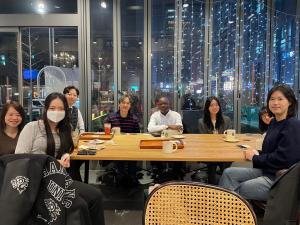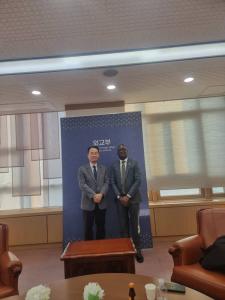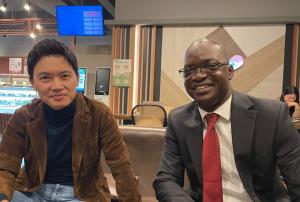Hon. Pia Philip Michael’s Seoul Visit Deepens South Korea–South Sudan Cooperation on Peace, Education and Development
Students and faculty from Hanyang University reflect on South Sudan’s peacebuilding, intersecting with global debates on AI, governance, and development.
SEOUL, SOUTH KOREA, November 25, 2025 /EINPresswire.com/ -- At the invitation of the Korea International Cooperation Agency (KOICA), Hon. Pia Philip Michael, Undersecretary of the National Ministry of Peacebuilding in the Republic of South Sudan, has completed a strategic visit to Seoul that strengthened cooperation between South Sudan and the Republic of Korea around peacebuilding, education, and human resource development.The visit came as South Korea steps up its engagement with Africa. In June 2024, South Korea announced plans to increase its official development assistance to Africa to around US$10 billion by 2030 and to provide US$14 billion in export financing to support Korean firms’ trade and investment on the continent, also highlighting the need to enhance people-to-people exchanges and links between universities, research institutes, and local communities in Korea and Africa.
Into this broader policy shift, Hon. Pia’s face-to-face meetings in Seoul focused on how South Korea’s strengths in education, human capital, and digital innovation can support peace and development in South Sudan – and how South Sudan can, in turn, become a meaningful partner in Korea’s Africa strategy.
At Korea’s Ministry of Foreign Affairs, Hon. Pia met Mr. Park Jong-han, Director-General of the Development Cooperation Bureau, and Ms. Kyung Hwa Chung, Director of the International Development Cooperation Agenda Division. Mr. Park, who leads Korea’s development cooperation dialogues and recently underlined that “education will determine whether AI serves the many or just the few” at the launch of UNDP’s Human Development Report in Seoul, placed particular emphasis on quality education and skills development as the linchpin of equitable digital transformation.
Hon. Pia set out South Sudan’s priority to move from repeated emergency responses toward long-term peacebuilding anchored in human resource development – training teachers and local peace workers, strengthening public administration, and opening pathways for South Sudanese youth into regional and global knowledge networks. The discussions explored how Korean ODA, scholarship schemes, and technical cooperation can support these goals, ensuring that future projects in South Sudan align with both Korea’s Africa commitments and South Sudan’s Peacebuilding mandates.
A distinctive feature of the visit was Hon. Pia’s engagement with Hanyang University’s Graduate School of International Studies (GSIS). GSIS, whose Department of Global Strategy and Intelligence Studies is Korea’s first in-depth program in intelligence and strategy, was founded to train global strategic-intelligence professionals and future planners, strategists, and decision-makers for national institutions and diverse industries.
The school is recognized for its strong academic standing and international community, with students from numerous countries studying politics, international relations, and regional issues. During Hon. Pia's conversation with Professor Joohan Ryoo, Chair of Global Strategy and Intelligence Studies, Dr. Xiuli (Tina) Chen, and GSIS students. Over discussion, Professor Joohan Ryoo exchanged views on how South Sudan’s peacebuilding agenda intersects with global debates on AI, governance, and education. Hon. Pia described the practical challenges of consolidating peace in a post-conflict environment. At the same time, students and faculty reflected on how the Korean and other Asian nations' experiences in rapid development and education policy might be carefully and respectfully adapted to South Sudan’s very different context.
Rather than a formal working session, the Hanyang encounter functioned as an open, exploratory dialogue. Ideas ranged from the potential of AI-supported information systems for agriculture and local conflict prevention to the role of online and blended learning in giving South Sudanese youth greater access to higher education without leaving their communities. For many students, it was a rare chance to speak directly with a senior official from a conflict-affected country about how theory, research, and technology translate into day-to-day decisions on the ground.
Hon. Pia also took part in a broader gathering with PhD student Qiongyin Cao from GSIS and Yayi Wang from the Humanities Department at Hanyang University, joined by University of Bristol alumni representatives Ms. Jinhwa Kim(김진화), Ms. Harin Lee(이하린), Mr. Bayarbaatar Bold, and Mr. Ikhyeon Lee (이익현), Credit Risk Analyst trainee - Credit Agricole CIB, currently based in Korea. The Korea–Africa collaboration had called for this kind of people-to-people engagement, noting that active exchanges between Africans and Koreans, either from local communities or returning from abroad, “contribute to increasing mutual understanding and strengthening solidarity.” In Seoul, that principle took concrete form as young scholars and practitioners discussed future research collaborations, potential internships in international organizations and NGOs, and ways to maintain ongoing contact with peers in South Sudan.
The conversations underlined the importance of speaking in person. Korean and international students moved beyond headlines and statistics, asking the Undersecretary detailed questions about governance, reconciliation, and youth aspirations in South Sudan. Hon. Pia, in turn, heard directly from a generation of Koreans and global graduates who are likely to populate the ministries, think tanks, companies, and NGOs that will shape Korea’s role in the world over the coming decades.
Across ministries, campuses, and informal meetings, the visit consistently linked peacebuilding at home with partnership abroad. In government offices, the dialogue with Mr. Park and Ms. Chung connected South Sudan’s needs to Korea’s expanding ODA framework and Africa engagement. On campus, conversations with Professor Ryoo, Dr. Chen, and students showcased how a Korean university dedicated to global strategy and intelligence can become a listening and learning partner for a country in transition. And in the student–alumni round-table, the spirit of people-to-people vision was visible in real time, as participants imagined future joint projects that might bring them to Juba, Seoul, or elsewhere on the continent.
For Hon. Pia, the Seoul mission was an opportunity to carry the responsibilities of the National Ministry of Peacebuilding onto an international stage: to tell South Sudan’s story with clarity, to seek support grounded in mutual respect, and to ensure that every conversation points back to tangible benefits for communities living with the legacy of conflict. For South Korea and Hanyang University, the visit offered a glimpse of how their expertise in education, human capital, and digital innovation can contribute to a more peaceful, interconnected future – and how cooperation with South Sudan can become a meaningful part of Korea’s evolving partnership with the Global South.
Xiuli Chen
Hanyang University
email us here
Legal Disclaimer:
EIN Presswire provides this news content "as is" without warranty of any kind. We do not accept any responsibility or liability for the accuracy, content, images, videos, licenses, completeness, legality, or reliability of the information contained in this article. If you have any complaints or copyright issues related to this article, kindly contact the author above.



